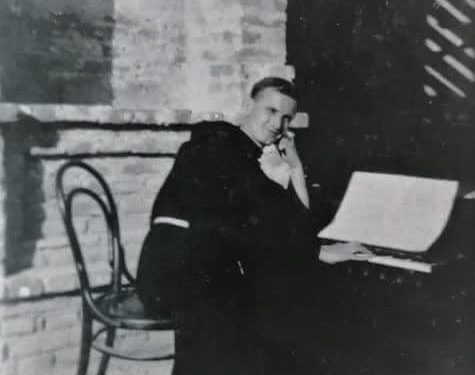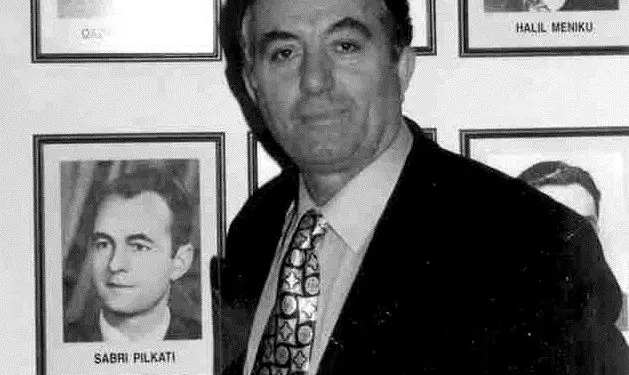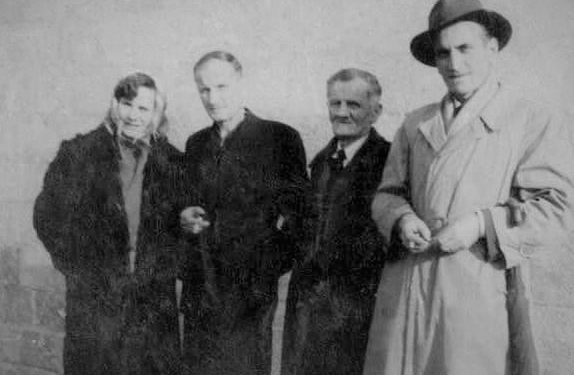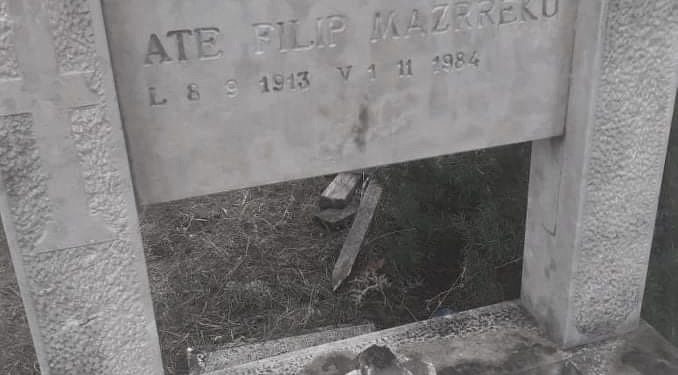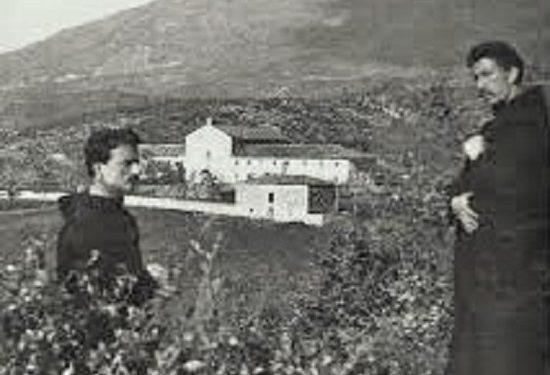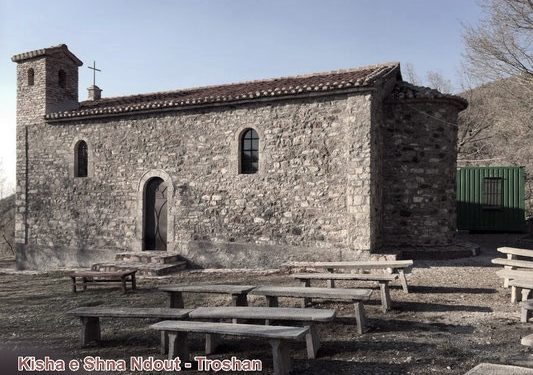By Tanush Mulleti
Memorie.al / Tanush Mulleti was born in Tirana in 1944, where is the origin of their family, where Sulejman Pashë Bargjini (Mulleti), is known as the founder of Tirana. After the imprisonment of his father, Haki Mulleti in 1945, the family went into exile, leaving Tirana, first to Kavajë and then to the district of Shkodra, where they stayed until the fall of communism and only at the beginning of the 90s. They were able to return to Tirana. After finishing high school, Tanush Mulleti served for some time as a teacher in the most remote villages of the Lezha district, (at that time he finished by correspondence and graduated from the Faculty of Natural Sciences, Mathematics-Physics branch), but for reasons biographical, eventually removed him from education. Based on this, Tanush Mulleti started working as a worker in various enterprises in the Shkodra district, mainly in the Water Reclamation Enterprise, where together with Xulio Baltazar Benusi, (politically persecuted), they distinguished themselves as master rationalizers. In the district of Shkodra, he stayed with his family until the beginning of the 90s, where he was also engaged in democratic processes and for some time served as the head of the Financial Police of the district of Shkodra. Then he came to Tirana, where he was appointed to the General Directorate of Prisons, under the Ministry of Internal Affairs. During the period 1991-1994, he did several specializations from the Council of Europe in Rome, Strasbourg, Tirana, etc., for State Administration and Human Freedoms and Rights. After the 90s, in addition to being involved in the National Association of Former Political Prisoners and Persecuted of Albania (for some time he was its chairman), he collaborated with the newspaper “Liria” and several other newspapers, writing with dozens of articles, mainly about the crimes of the communist regime of Enver Hoxha and his successor, Ramiz Ali. Tanush Mulleti has been decorated with the “Torch of Democracy” and several other medals from the Presidents of the Republic.
DEMOLITION
As after a short chronicle
Troshan, February 9, 1967. It was one of the coldest days, pieces of ice were falling and not rain, and everything was like snow, frost, frost, in a word “God’s gazep”. The postman brought the newspapers we subscribed to. We began to read Enver Hoxha’s speech of February 6 (against religion and backward customs) in various newspapers.
After the reading, Father Filipi said: – “I’m not busy with Easter here.”
With Father Philip, we began to remember the “visitors” of the last 18 months.
First, it was Dhimitër Shuteriqi, who visited the Church and his eyes were fixed on the golden royal crown, with red ruby stones (like the Kremlin Clocks) of St. Mary. He had given the ring to Father Gjergj Fishta, a Hungarian countess, and Fishta had given it to the church of his village. (At that time it cost millions of dollars). In the newspaper “Drita”, Shuteriqi wrote: “A trip for two circuses”.
From the Ministry of Education and Culture, M. Gërcalliu, Editor-in-Chief of the “Mesuesi” newspaper, and P. Kureta, of the “Sporti Popullor” newspaper, came to work in Troshan. With a recommendation from Tonin Rrota (former student of Father Filipi), he responded to their interest in teaching music in schools, which had notable shortcomings. Father Philip, as a musician and teacher, told him about the necessity of musical bands. Before 1944, every school in Shkodër had its own band.
One beautiful day, in the middle of the church yard, which was also the school, the “GAZ” 69″ of Petri Dumes, Chief of the General Staff of the Army, Hito Çakos, Commissioner of Corps 8001 and Deputy Commander stopped of the Corps. With disdain and impudence, they visited the surrounding classrooms and the church in the middle of classes, issued a “word of order”: next year the area around the church will become a military zone. It was understandable because the Church of Shna Ndou in Laç i Kurbini was closed and a military zone, and therefore the people continued their pilgrimage to the church of Troshan, which was also that of Shna Ndou.
The Church or College of Troshan is early, with an impressive architecture, from where the field of Zadrima can be seen as if in the palm of your hand. Priests who have left their mark on Albanian culture have studied in this college, such as Father Gjergj Fishta, Father Shtjefën Gjeçovi, etc. The Troshanas are peaceful, hardworking, educated and devout Catholics.
The next visitors to the Church of Troshan were the Deputy General Director of the State Archives Xhavit Struga (former senior officer of the State Security and Prosecutor) and Dul Rrjolli, from the Lezhë Internal Affairs Branch. On the eve of the 500th anniversary of Skanderbeg’s death, they were tasked with taking from Father Philip, (for better or for worse), Father Martin Gjoka’s opera “Two flowers on Skanderbeg’s grave” (don’t err, from 1930).
Father Philip resisted several times, but after 2-3 weeks he gave them a copy. In the waiting room there was also a painting of Skanderbeg, kneeling before the Pope, during the blessing, the work of the Austrian painter, Father Jozef Dochman.
(On the 500th anniversary of Skanderbeg, operatic works and paintings were not published, because the authors were Catholic priests and communist historiography denied the blessing of Skanderbeg from the Pope).
Father Philip, as a sportsman, was a “famous” hunter; he had a large pair and two hounds, “Limon and Vocrin”. Someone from above had noticed them and they took the pair, under the pretext of why you shot with pairs, after the hunting season closed.
The truth was that when the wedding guests came to the church with vu kunors, as according to the custom tradition, they shot with rifles and Father Philip answered them with couples.
After the beginning of the Cultural Revolution, Father Filipi believed that they would leave one church for each district and drew parallels with the history of the Soviet Union, which had not closed all religious institutions.
According to this reasoning, he believed that the church of Troshan could stand, since it covered Zadrima, Kashnjeti and Mirdita.
In fact, the last one that stood that fortune was the church of Troshan. A few days before Easter, they put a lightning bolt on her and she was closed.
The commission tasked to take over the church came from the center. After they took the Royal Crown, the golden candlesticks and the necessary things, the library books, religious and non-religious figures, etc., they threw them in the middle of the courtyard and set them on fire.
Father Filipi did not leave the village, he left his cell and arranged the jerevi, where the cattle used to be, and lived there with his father, almost 100 years old (former old teacher in the opening of Albanian schools in Kosovo) and with the nun, “Motra Tone” .
Life and work separated us. I joined the Labor Department as a soldier and after the army, I started working in Shkodër.
I visited Father Filip in Troshan once, together with his grandson, and the second time, when his father Pjetër died. The third time, I went to visit him, sometime around 1977. I slept that night there, talked for a long time and was glad that the villagers respected him and that the local communists did not fall on his neck. The bottom line and those Catholics were. Father Filipi had stayed in the village as a result of a message that the villagers themselves had brought to him.
Father Philip, everyone knows him as a cultured and smiling man, but now he was a little pale from illness, but more so because the people were forcefully forced to leave the faith and customs that characterize him.
As an example, he brought me the tragedy of a young couple, where, among other things, he told: “The officer husband (no party) and the teacher wife, were married with a child. In a new house, better than ever, they lived with their father and mother together. One night the old lady of the house (grandmother) takes the child and without telling anyone, secretly takes it and baptizes the child. After some time, the grandfather, without telling anyone, secretly takes the child to baptize at night. Similarly, the mother of the child, without telling anyone, baptizes him secretly.
Another night, the child’s father, the officer, without telling anyone, takes him to the priest to be blessed. The priest says to him: Lord, I have baptized this child four times to date!
The next day, the child’s father asks the old woman and the old man and they admit that they baptized the child secretly, out of fear, telling him that you don’t believe and don’t get fired. At dinner, he asks his wife and she agrees, saying that I was afraid to tell him. In a very serious psychological state, the child’s father went into depression and from that day he was completely ruined.
After two months, I was living with Ing. Follow Naraçin, (graduated in Vienna), former Minister of World Affairs at the time of Zog and radio pioneer in Albania. After I told him the tragedy of that family, he said: Now the bad will cover the good. The barricades or pillars of the nation, such as: religion, customs, traditions, and canons, these barricades, which stopped evil, were removed, burned and burned. It is clearly understood that evil easily overshadows good. This is the biggest destruction of the character of the human personality, in the history of the Albanian nation. Time will prove it.”
Most of these people have passed away, but their prophecy was confirmed. We have 32 years of pluralism, “freedom of speech”, protracted transition and we really feel every day that a person with noble virtues, with a serious and sincere personality and character is missing. Memorie.al




